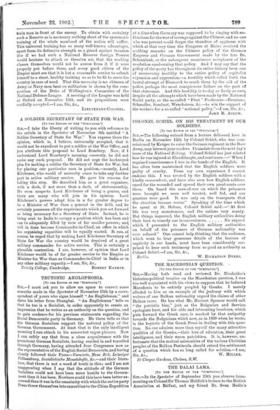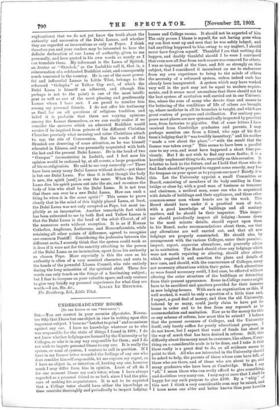THE DALAI LAMA.
THE EDITOR OP TEl "SPECTATOR."] SIR,—In the Spectator of September 20th you observe (com- menting on Colonel Sir Thomas Holdich's lecture to the British Association at Belfast, and my friend Dr. Sven Iledin's
explorations) that we do not yet know the truth about the authority and succession of the Dalai Lamas, and whether they are regarded as incarnations or only as Popes. I think therefore you and your readers may be interested to hear the definite declaration of one Lama of authority, given to me personally, and here quoted in his own words as nearly as I can translate them. My informant is the Lama of Spittok, an Avatar or " Skushok," as the Ladakhis call it, that is, a reincarnation of a celebrated Buddhist saint, and consequently much venerated in the country. He is one of the most power- ful and influential Lamas in Little Tibet, belongs to the reformed " Gelupka " or Yellow Cap sect, of which the Dalai Lama is himself an adherent, and (though this perhaps is not to the point.) is one of the most intelli- gent as well as one of the most pleasing and gentlemanly Lamas whom I have met. I am proud to number him among my personal friends. I do not offer his testimony as final, for on all questions of religious tradition and belief it is probable that there are varying opinions among the Lamas themselves, as we can easily realise if we consider the answers which an educated Buddhist would receive if he inquired from priests of the different Christian Churches precisely what meaning and value Christians attach to, say, the rite of Communion. But the words of this Skushok are deserving of some attention, as he was himself educated in llama, and was personally acquainted with both the last and the present Dalai Lamas. He is the head of two " Gumpas" (monasteries) in Ladakh, and I feel sure his opinion would be endorsed by, at all events, a large proportion of his co-religionists. He said to me very earnestly :—" There have been many many Dalai Lamas without doubt,—yet there is but one Dalai Lama. For thus it is that though the body is new, the spirit [soul] is ever the same. When the Dalai Lama dies his spirit passes out into the air, and re-enters the body of him who shall be the Dalai Lama. It is not true that there can ever be a new Dalai Lama. How can such a thing be when it is the same spirit !" This seems to prove clearly that in the mind of this highly placed Lama, at least, the Dalai Lama was not only accepted as Pope, but most im- plicitly as an incarnation. Another remarkable fact which
has been reiterated to me by both Red and Yellow Lamas is that the Dalai Lama is the head of the whole Church, of all the numerous sects without exception. It is as if Roman Catholics, Anglicans, Lutherans, and Nonconformists, while retaining all other points of difference, agreed to recognise one common Pontiff Considering the jealousies between the different sects, I scarcely think that the system could work as it does if it were not for the sanctity attaching to the person of the Dalai Lama as an incarnation, apart from his authority as chosen Pope. More especially is this the case as his authority is often of a very nominal character, and rests in the hands of the powerful Lhassa. Council, who rule entirely during the long minorities of the spiritual chief. These few words can only touch on the fringe of a fascinating subject ; but I fear to trespass on your valuable space, and only venture to give very briefly my personal experiences for what they are
worth.—I am, Sir, &c., LILIAN LE MESITRIER. The Residency, Leh, Little Tibet.











































 Previous page
Previous page